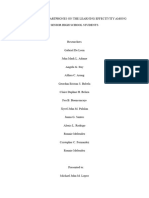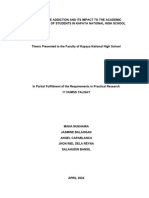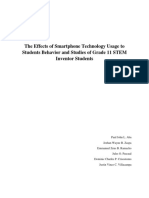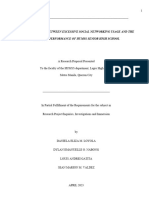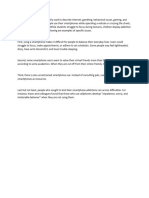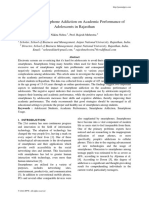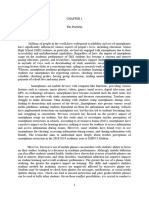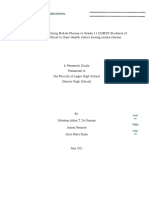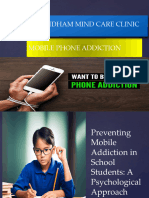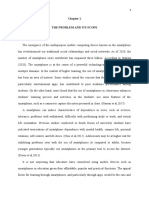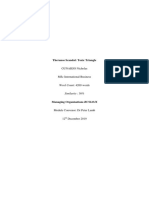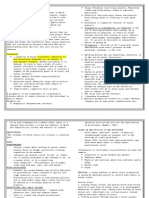According to Buctot et al.
(2021) although smartphones are now considered a necessity for everyone,
their improper use is becoming problematic and a major concern among adolescents’ parents and
educators. Over the past decade, many studies have discussed the negative effects of smartphone
addiction (SA) on individuals’ mental health and well-being as well as on adolescents’ psychological well-
being.
Smartphone use can be a threat to students’ scholastic performance, particularly when the use of it
becomes excessive, as this can lead to homophobia (NMP) and smartphone addiction (SA), which have
impulsive, uncontrollable desires to use a smartphone as their common attribute. If someone becomes
anxious when he/she is away from his/her smartphone, or if they fear losing it or not being able to
access it, they are likely to be experiencing NMP (Buctot et al., 2021).
Smartphone addiction, just like any other addiction, leaves a devastating effect on users' physical,
cognitive, and economic well-being. Furthermore, students' excessive use of smartphones may have an
adverse effect on their academic performances and learning activities, particularly for universities where
there is more independence to regulate how and when to use a smartphone (Abbasi et al., 2021).
In a similar vein, the Pew Research Centre [5] stated that 95% of students in universities use a
smartphone. Smartphones offer several conveniences in life and provide an exclusive experience,
enabling students to learn online anywhere and anytime(Abbasi et al., 2021).
The previous study also showed that the majority of students spend their time more on Facebook and
other social media than on academic purposes [10]. Students who tend to send text messages and check
Facebook while doing assignments were negatively related to their academic performance
( Rathakrishnan et al., 2021).
For example, Facebook use is a key contributor to student multitasking while studying (Judd, 2014).
Additionally, instant messaging is a major distraction associated with failure to complete schoolwork
(Junco & Cotten, 2011).
Distractions from learning are powered by students' fascination with the multitude of smartphone apps
that cater to every aspect of their lives. This fascination is mediated by the need for and the ease of use
of apps (Calderwood et al., 2014).
Buctot, D.B., Kim, N., & Kim, S.-H.(2021). Personal Profiles, Family Environment, Patterns of Smartphone
Use, Nomophobia, and Smartphone Addiction across Low, Average, and High Perceived Academic
Performance Levels among High School Students in the Philippines. Int. J. Environ. Res. Public Health, 18,
5219. https://doi.org/10.3390/ijerph18105219
Abbasi G., Jagaveeran M., Goh Y., Tariq B. (2021). The impact of type of content use on smartphone
addiction and academic performance: Physical activity as moderator.
https://doi.org/10.1016/j.techsoc.2020.101521
�Rathakrishnan B., Singh S.S.B., Kamaluddin M.R., Yahaya A., Nasir M.A.M., Ibrahim F., Rahman Z.A.
(2021)
Smartphone Addiction and Sleep Quality on Academic Performance of University Students: An
Exploratory Research.
https://doi.org/10.3390/ijerph18168291
Judd, T. (2014). Making sense of multitasking: The role of Facebook.
https://doi.org/10.1016/j.compedu.2013.08.013
Junco, R., & Cotten, S. (2011). Perceived academic effects of instant messaging use.
https://doi.org/10.1016/j.compedu.2010.08.020
Calderwood, C., Ackerman P., & Conklin E. M. (2014). What else do college students “do” while
studying? An investigation of multitasking. https://doi.org/10.1016/j.compedu.2014.02.004

